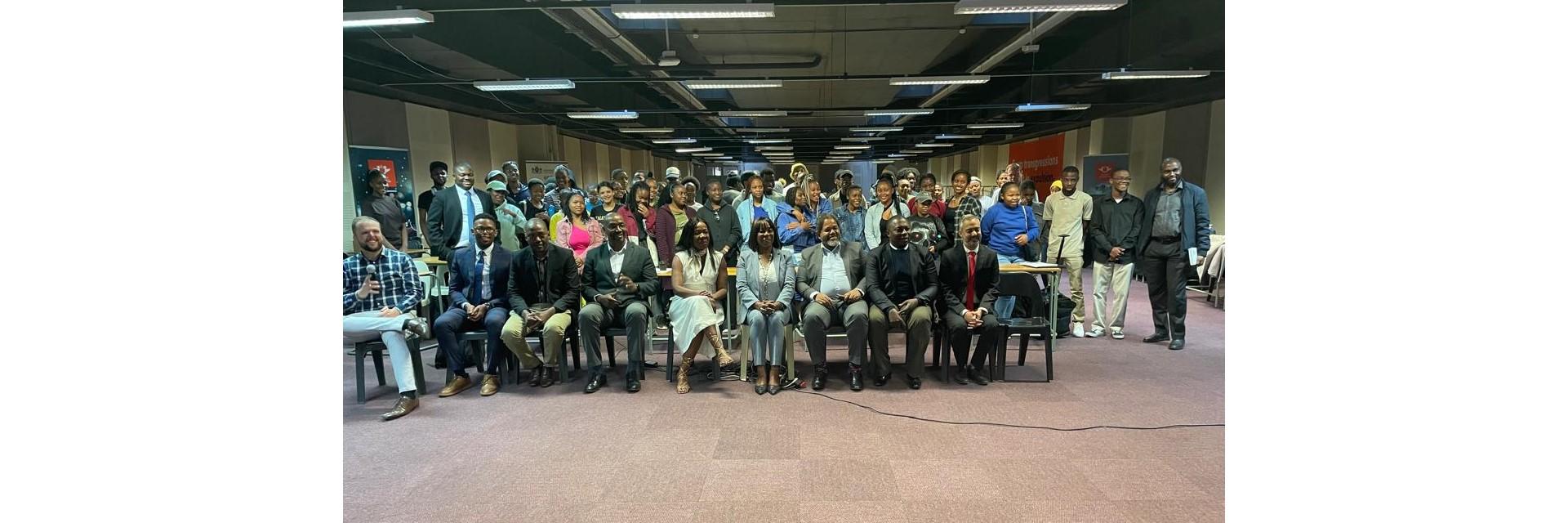Johannesburg, South Africa, September 06, 2024 (ECA SRO SA) - The United Nations Economic Commission for Africa, Sub-Regional Office for Southern Africa (ECA SRO-SA), in collaboration with the University of Johannesburg, Department of Economics, and the Gauteng Department of Economic Development, delivered a public lecture to economics students, lecturers, policy makers and other stakeholders on how to leverage technology and Fourth Industrial Revolution (4IR) in alleviating poverty, income inequality and youth unemployment in South Africa.
South Africa continues to grapple with high levels of poverty, income inequality, and youth unemployment. Despite various policy interventions and programs, these intertwined challenges persist and thus require innovative and multifaced approaches. The lecture, under the theme, “Leveraging Technology and the Fourth Industrial Revolution (4IR) to Reduce Youth Unemployment, Poverty and Inequality in South Africa”, aimed to promote student engagement on the potential of 4IR technologies in driving economic growth and job creation.
In his opening remarks, Prof. Husain Coovadia, Vice Dean of Income Generation and Global Engagement, highlighted the importance of collaboration among government, the private sector, academia, and development partners in addressing development challenges. He emphasized that, “only through such collaboration can we ensure that the benefits of 4IR technologies are broadly shared and contribute to sustainable development and as we identify the key skills required for the digital economy, we must prioritize the education and training of our youth. They are the future workforce, and our responsibility is to equip them with the tools they need to thrive in a rapidly changing world”.
Ms. Kefibe Masiteng, Head of Resident Coordinator Office, speaking on behalf of the United Nations family in South Africa, underscored that South Africa has one of the highest rates of unemployment and inequality in the world with the gini co-efficient of 0.63 (63 percent). She noted that, “tackling inequality is essential for building a cohesive society and fostering long-term stability. It requires policies that promote inclusive growth, ensure equitable access to education and healthcare, and address the historical injustices that continue to affect large population segments.”
Mr. Nelana Bulumko, Deputy Director-General, Economic Planning and Development, concurred with the Dean on the importance of having a platform that helps students to benefit from expert knowledge and called upon the partners to continue in this endeavor and especially ensure that key development issues are interrogated with active student participation. He also pointed out the importance of collaboration and support of development partners in promoting the African Continental Free Trade Area Roadmap for Gauteng, the industrial park for the future, and training and capacity building.
The Chief of the Inclusive Industrialization Section, ECA SRO-SA, Ms. Olayinka Bandele spoke about the role of technology and 4IR in alleviating poverty and income inequality in Southern Africa. She gave an overview of the challenges the region was facing and indicated that reducing the gap between labor demand and supply will require a policy focusing on improving labor quality and increasing the demand for labor. She outlined ECA flagship projects related to digitization that can be a catalyst for South African youth such as: Connected African Girls in Lusophone countries, Lobu Small Stock Farm center of excellence in Botswana, African Trade Exchange and STEAM Center of Excellence in Rwanda. Ms. Olayinka concluded that, “it is important to promote digital skills, foster innovation and entrepreneurship, expand digital infrastructure and transform key economic sectors to harness the benefit of 4IR”.
Professor Ngepah Nicholas talked about how to leverage technology to alleviate poverty and inequality in South Africa. He analyzed the key issues confronting the country and suggested that Artificial Intelligence adoption may lead to structural changes in the labor market, potentially increasing unemployment and reducing opportunities for low-skilled workers while having mixed effects on skilled employment.
Mr. Kenneth Moiloa, Commercialization Specialist, speaking on behalf of the Chief Executive Officer of The Innovation Hub, informed the meeting that South Africa has made significant progress in transitioning from policy formulation to implementation on innovation. He called on all partners to join The Innovation Hub in addressing the critical challenges of youth unemployment, poverty, and inequality.
The lecture ended with a Question-and-Answer session that allowed participants to raise pertinent questions and engage further with the organizers of the lecture. The organizers concurred on the importance of such lectures that create a platform for South African youth to debate and engage on economic issues affecting their country and region. Furthermore, the organizers also discussed potential areas for further collaboration to encompass research, co-implementation of projects such as “the industrial park of the future” as well as the development of monitoring systems of implementable projects for the Gauteng Provincial Government.
Issued by:
The Sub-Regional Office for Southern Africa
UN Economic Commission for Africa (ECA)
P.O. Box 30647, Lusaka, Zambia.
Media Contacts:
Ms. Lavender Degre
Communication Officer
Tel: +260 211 228502/5 Ext. 21307
DL: +260 211 376607
Email: lavender.degre@un.org

